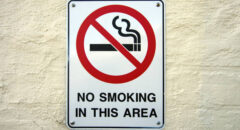
When most people think of hypnosis, they think of a magician, dangling a pendulum in front of someone while saying, “You’re getting sleepy …” but that is not all hypnosis is about. In fact, many people who want to stop smoking turn to hypnotherapy to achieve their goal.
RELATED: 8 Natural Remedies To Quit Smoking
Hypnosis involves using relaxation techniques to bring a person into an altered state of consciousness known as a trance. While in a trance, the person becomes more apt to accept suggestions, ideas, and images provided by the hypnotist. The trance state also can help people better understand their bodies and their emotional and psychological responses.
Research does not support hypnotherapy as a proven means to help people stop smoking. A scientific review of existing studies found no evidence to suggest that hypnotherapy worked better than other smoking cessation aids or no treatment at all.
However, some individuals have reported success in quitting smoking with the help of hypnotherapy. For hypnosis to be successful as a way to stop smoking, the person has to have faith in the therapist and be OK with being in a passive and susceptible state of mind.
RELATED: Trying to Quit Smoking? Here’s Why you Should Avoid Vapes
History of Hypnotherapy as Treatment
Hypnotherapy has been used in psychological treatment since the 1950s when psychiatrist Milton H. Erickson showed the potential of hypnosis as an aid to traditional therapy. The American Medical Association and the American Psychological Association recognized hypnotherapy as a valid medical procedure in 1958.
The first use of hypnotherapy to help people stop smoking was described by Dr. Herbert Spiegel in a 1970 journal article. His hypnotic strategy has become known as the "Spiegel technique" and involves concentration on three main ideas:
• Smoking is poisonous to your body.
• You need your body if you want to live.
• If you want to live, you need to respect and protect your body.
Today, hypnotherapists will suggest that smokers associate cigarettes with unpleasant tastes, odors or sensations—for instance, that cigarette smoke smells like bus fumes, that the smoke has a nasty taste, or that smoking will cause you to suffer from dry mouth. They might
also suggest that smokers believe that they have lost the desire to smoke and can easily cope with their nicotine withdrawal symptoms.
What to Expect from Hypnotherapy to Stop Smoking
Your hypnotherapist will begin your first session by asking questions about your medical history and the issue that brought you in. He or she will likely give you an explanation of hypnosis and how it works, and then will guide you into your first trance. The therapist will also probably teach you some self-hypnosis techniques, so you can reinforce the hypnotherapy on your own. Hypnotherapy sessions typically last about an hour.
Multiple sessions to reinforce the suggestions being provided by the hypnotherapist are usually recommended. Most people begin to show progress after four sessions, although hypnotherapy can continue as long as you need to have the suggestions reinforced.
The national average cost for a hypnotherapy session is about $85, but the cost varies widely across the country, with rates on the East and West Coasts reaching up to $125.
Pros and Cons
Hypnotherapy can be successful as a combination therapy, used in conjunction with other treatments for such conditions as stress, anxiety, depression, and pain. Hypnosis also does not involve the use of any medications, which might appeal to smokers who aren't interested in using drugs or nicotine replacement products.
Keep in mind that hypnotherapy is not dangerous. The hypnotist cannot make you do something you don't want to do. The greatest risk usually involves the unintended creation of false memories based on suggestions from the hypnotherapist.
As for the drawbacks, the major criticism of hypnotherapy for smoking cessation is that no research to date has proven it works. Also, hypnotherapy is not considered a valid treatment for people who are alcoholics or drug addicts or are dealing with hallucinations and psychotic episodes.
Finding a Hypnotherapist
Hypnotherapy should be performed by a mental health professional who has been licensed and certified and has received special training in hypnosis. Several professional groups can put you in touch with an accredited hypnotherapist in your area:
• American Society of Clinical Hypnosis
• Society for Clinical and Experimental Hypnosis
• American Association of Professional Hypnotherapists
Also ask your doctor, who might be able to recommend a known and trusted hypnotherapist.








